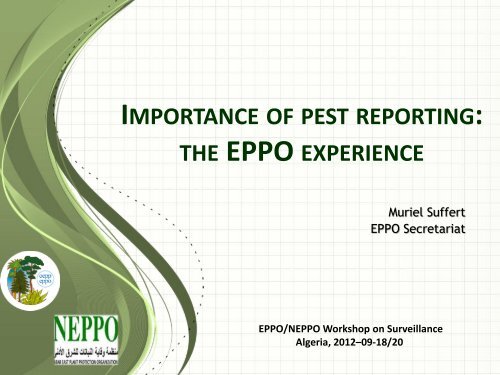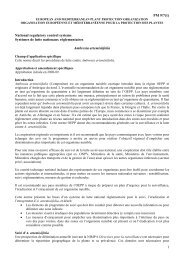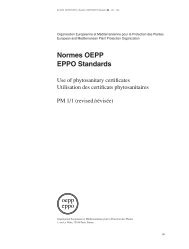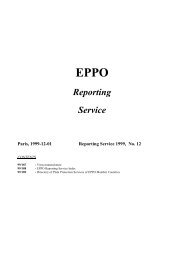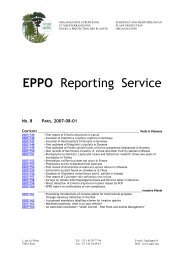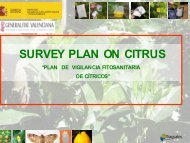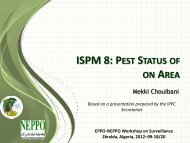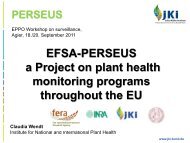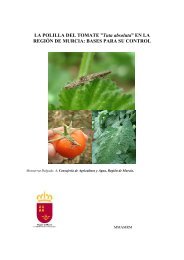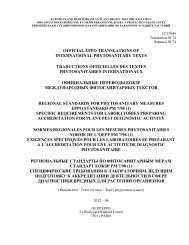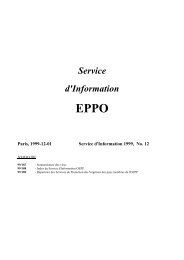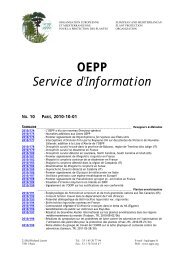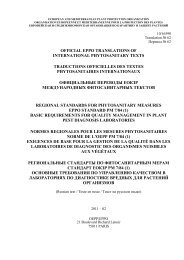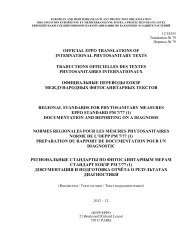importance of pest reporting the eppo experience - Lists of EPPO ...
importance of pest reporting the eppo experience - Lists of EPPO ...
importance of pest reporting the eppo experience - Lists of EPPO ...
Create successful ePaper yourself
Turn your PDF publications into a flip-book with our unique Google optimized e-Paper software.
IMPORTANCE OF PEST REPORTING:<br />
THE <strong>EPPO</strong> EXPERIENCE<br />
Muriel Suffert<br />
<strong>EPPO</strong> Secretariat<br />
<strong>EPPO</strong>/N<strong>EPPO</strong> Workshop on Surveillance<br />
Algeria, 2012–09-18/20
REPORTING OBLIGATIONS<br />
TO <strong>EPPO</strong>
Reporting obligations<br />
<strong>EPPO</strong> Convention<br />
Article VI. - Obligations <strong>of</strong> Member Governments<br />
a. Member Governments shall furnish to <strong>the</strong><br />
Organization so far as is practicable such<br />
information as <strong>the</strong> Organization may<br />
reasonably require in order to carry out its<br />
functions, including in particular <strong>the</strong><br />
information referred to in Article V f1 and V<br />
f2.
Reporting obligations<br />
<strong>EPPO</strong> Convention<br />
Article V. – Functions<br />
The functions <strong>of</strong> <strong>the</strong> Organization shall be:<br />
f. to disseminate information by<br />
– 1. obtaining information from Member Governments on<br />
<strong>the</strong> existence, outbreak or spread <strong>of</strong> <strong>pest</strong>s, and<br />
conveying such information to Member Governments;<br />
– 2. providing for <strong>the</strong> exchange <strong>of</strong> information on national<br />
phytosanitary legislation, lists <strong>of</strong> regulated <strong>pest</strong>s, or<br />
o<strong>the</strong>r measures affecting <strong>the</strong> free movement <strong>of</strong> plants<br />
and plant products;<br />
– 3. establishing a documentation and information service<br />
and publishing in an appropriate form material for<br />
technical or scientific advancement;
Reporting obligations<br />
IPPC Article IX on RPPOs<br />
2. The regional plant protection organizations<br />
shall function as <strong>the</strong> coordinating bodies in<br />
<strong>the</strong> areas covered, shall participate in<br />
various activities to achieve <strong>the</strong> objectives <strong>of</strong><br />
this Convention and, where appropriate,<br />
shall ga<strong>the</strong>r and disseminate information.
HOW <strong>EPPO</strong> DEALS WITH<br />
PEST REPORTS?
Why collect <strong>pest</strong> reports?<br />
• To inform all <strong>EPPO</strong> member countries about<br />
new introductions, new outbreaks, eradication<br />
• To initiate <strong>EPPO</strong> activities on Pest Risk<br />
Analysis, <strong>pest</strong> listing, preparation <strong>of</strong> <strong>pest</strong>specific<br />
standards
What is reported to <strong>EPPO</strong> by NPPOs?<br />
• New introductions and outbreaks <strong>of</strong> regulated <strong>pest</strong>s<br />
• Eradication <strong>of</strong> regulated <strong>pest</strong>s<br />
• Updates about <strong>the</strong> situation <strong>of</strong> regulated <strong>pest</strong>s<br />
• Emergence <strong>of</strong> new phytosanitary problems<br />
• Notifications <strong>of</strong> non-compliance (interceptions) – via<br />
EUROPHYT for EU member states and Switzerland<br />
• Phytosanitary regulations and lists <strong>of</strong> quarantine<br />
<strong>pest</strong>s
Reporting <strong>pest</strong> status<br />
<strong>EPPO</strong> encourages its member countries to report<br />
<strong>of</strong>ficial <strong>pest</strong> status using <strong>the</strong> terms <strong>of</strong> ISPM 8<br />
In <strong>the</strong> <strong>EPPO</strong> Reporting Service and in PQR, <strong>the</strong>re is a<br />
distinction between:<br />
<strong>pest</strong> situation (interpretation by <strong>the</strong> <strong>EPPO</strong><br />
Secretariat)<br />
<strong>pest</strong> status (<strong>of</strong>ficial declaration made by <strong>the</strong><br />
country)
Pest <strong>reporting</strong><br />
How to deal with diverse sources and formats?<br />
Information is summarized, harmonized, put back into its<br />
general context (checking what was <strong>the</strong> situation before) by<br />
<strong>the</strong> <strong>EPPO</strong> Secretariat when it is published in <strong>the</strong> <strong>EPPO</strong><br />
Reporting service or entered into PQR
<strong>EPPO</strong> Standard: Format for <strong>pest</strong> reports<br />
Harmonized format for<br />
<strong>pest</strong> reports (compatible<br />
with <strong>the</strong> FAO format)<br />
adopted in September<br />
2011.<br />
<strong>EPPO</strong> member countries<br />
have started using this<br />
format to send <strong>EPPO</strong><br />
<strong>of</strong>ficial <strong>pest</strong> reports.
<strong>EPPO</strong> Format for <strong>pest</strong> reports<br />
Future plans<br />
<strong>EPPO</strong> Standard PM 1/5: first step towards harmonization <strong>of</strong><br />
<strong>pest</strong> report contents<br />
Discussions should continue with IPPC to improve information<br />
exchange and facilitate <strong>the</strong> task <strong>of</strong> NPPOs on <strong>pest</strong> <strong>reporting</strong><br />
• Develop a web-based interface to allow member<br />
countries to send <strong>the</strong>ir <strong>pest</strong> reports electronically to <strong>the</strong><br />
<strong>EPPO</strong> Secretariat<br />
• Explore <strong>the</strong> IT solutions that would allow rapid and easy<br />
exchange <strong>of</strong> information with o<strong>the</strong>r bodies collecting<br />
<strong>pest</strong> reports (IPPC and EU) - e.g. xml format?
COLLECTION OF OTHER<br />
DATA
Collection <strong>of</strong> non-<strong>of</strong>ficial data<br />
• Peer-reviewed international<br />
journals<br />
• CAB Plant Protection Database<br />
• National journals<br />
e.g. Annali della facolta di agraria,<br />
Acta Entomologica Sinica,<br />
Entomologia Croatica, Gesunde<br />
Pflanzen, Novényvédelem, Ochrona<br />
Roslin, Phytoma, Zashchita Rastenii...<br />
Over 100 publications reviewed!<br />
• Conference proceedings<br />
• Books<br />
• Internet ressources
Data collection via <strong>EPPO</strong> network<br />
• Experts from Panels<br />
-Panels specialized on <strong>pest</strong>s (diagnostics)<br />
-Panels dedicated to forestry, potato<br />
• Network <strong>of</strong> scientists
DISSEMINATION OF<br />
INFORMATION<br />
http://www.<strong>eppo</strong>.int/
<strong>EPPO</strong> convention (18th <strong>of</strong> April 1951)<br />
Article V. – Functions<br />
The functions <strong>of</strong> <strong>the</strong> Organization shall be:<br />
f. to disseminate information by:<br />
1. obtaining information from Member Governments on <strong>the</strong><br />
existence, outbreak or spread <strong>of</strong> <strong>pest</strong>s, and conveying such<br />
information to Member Governments;<br />
2. providing for <strong>the</strong> exchange <strong>of</strong> information on national<br />
phytosanitary legislation, lists <strong>of</strong> regulated <strong>pest</strong>s, or o<strong>the</strong>r<br />
measures affecting <strong>the</strong> free movement <strong>of</strong> plants and plant<br />
products;<br />
3. establishing a documentation and information service and<br />
publishing in an appropriate form material for technical or<br />
scientific advancement;
Information flow within <strong>EPPO</strong><br />
Official <strong>pest</strong> reports<br />
from NPPOs Literature,<br />
Internet surveys<br />
Stored data
Early warning: <strong>the</strong> <strong>EPPO</strong> Alert List<br />
• Initiated in 1999<br />
• Provides early<br />
warning<br />
• Suggests possible<br />
candidates for Pest<br />
Risk Analysis<br />
It provides<br />
information on:<br />
• distribution,<br />
• host plants,<br />
• biology,<br />
• damage,<br />
• transmission,<br />
• pathway,<br />
• possible risks<br />
Critically reviewed every year (when alert has been given and no<br />
fur<strong>the</strong>r action taken, <strong>pest</strong>s are deleted after 3 years on <strong>the</strong> list)<br />
Freely available on <strong>the</strong> <strong>EPPO</strong> website: www.<strong>eppo</strong>.int
<strong>EPPO</strong> Reporting Service<br />
More than 60 years <strong>of</strong> existence…<br />
One <strong>of</strong> <strong>the</strong> first<br />
issues <strong>of</strong> <strong>the</strong><br />
<strong>EPPO</strong> Reporting<br />
Service (1955)
<strong>EPPO</strong> Reporting Service: a free monthly newsletter<br />
It contains:<br />
New data on biology, host plants, diagnostic<br />
methods and geographical distribution <strong>of</strong><br />
quarantine <strong>pest</strong>s and <strong>pest</strong>s <strong>of</strong> potential<br />
quarantine significance<br />
Interception reports<br />
Additions to <strong>the</strong> <strong>EPPO</strong> Alert List, etc.<br />
2500<br />
2000<br />
1500<br />
1000<br />
500<br />
0<br />
2007 2008 2009 2010 2011<br />
RS EN<br />
RS FR<br />
Available by e-mail
<strong>EPPO</strong> Reporting Service: example <strong>of</strong> a first record
<strong>EPPO</strong> Reporting Service: interceptions
PQR Database new version<br />
Plant Quarantine data Retrieval system<br />
A database which contains information on many plant <strong>pest</strong>s (<strong>EPPO</strong> A1/A2<br />
listed <strong>pest</strong>s, EU regulated <strong>pest</strong>s, and some <strong>pest</strong>s that regulated in o<strong>the</strong>r<br />
parts <strong>of</strong> <strong>the</strong> world), as well as on invasive alien plants<br />
- Basic data (names, taxonomic position, <strong>EPPO</strong> codes)<br />
- Host plants<br />
- Geographical distribution<br />
- Plant commodities liable to carry quarantine <strong>pest</strong>s<br />
- Categorization<br />
http://www.<strong>eppo</strong>.int/DATABASES/pqr/pqr.htm<br />
http://newpqr.<strong>eppo</strong>.org/download.php
New features
Distribution maps
Pictures
Host plants / pathways
Categorization
Collection <strong>of</strong> phytosanitary regulations
Future plans: <strong>EPPO</strong> Global Database<br />
Pest-specific documents<br />
Data sheets<br />
Pictures<br />
Reporting Service<br />
Pest Risk Analysis<br />
Diagnostic expertise<br />
Laboratories & Experts<br />
PQR data<br />
Host plants<br />
Distribution lists & maps<br />
Categorization<br />
<strong>EPPO</strong><br />
Codes<br />
Pest-specific Standards<br />
National Regulatory control systems<br />
Diagnostic protocols<br />
Phytosanitary treatments<br />
EPPT data<br />
Plant & <strong>pest</strong> names<br />
Elements <strong>of</strong> taxonomy<br />
<strong>EPPO</strong> codes
Use <strong>of</strong> information to improve surveillance<br />
• Adapt import inspection based on noncompliance<br />
reports<br />
• Adapt surveillance plans if <strong>pest</strong> oubreaks<br />
are reported (e.g. in neighbouring<br />
countries)<br />
• Initiate surveys in link with emerging <strong>pest</strong>s
Conclusion<br />
• Pest reports are an important source <strong>of</strong><br />
reliable information<br />
• <strong>EPPO</strong> collect and process information to<br />
make it more readily available to users<br />
• Sharing results <strong>of</strong> surveillance programmes is<br />
crucial to protect plants at global scale
Thank you for your attention


